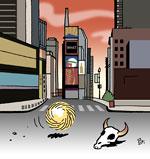The Way We Were
MAY 19, 2008
Find out a little more about a block, a building, the city—maybe even your neighbors—when you get your daily SmartMatch recommendations.

The 1988 song “Nothing but Flowers,” by the arty rock band Talking Heads describes a post-urban future where, “This used to be real estate; Now it’s only fields and trees.” But this idea didn’t begin with the band’s imagination. A 1932 article in Modern Mechanix magazine asks “How Much Longer Will Our Big Cities Last?” citing “scientific prophets” in wondering whether, in the future, Gotham-esque cities would be a thing of the past.
According to the piece, ”...it will be the intense congestion and mechanical complexity of the city that will bring about its destruction,” in addition to “fragile arteries by which [the city dweller] is supplied food, gas, electricity, water, milk, fuel, and communication…” There are references to other pre-space-, and certainly pre-information-age critics like economist Stuart Chase, who warned that big cities like Chicago, New York, and Detroit would bring about their own demise with their unwieldy infrastructure and unwise socio-economic policies.
Ok, we’ll give ‘em Detroit. But where would the former teeming urban millions live? The article cites visionaries like Frank Lloyd Wright as ambassadors to a future where, “diminutive villages…will cluster around a trading center…which workers will abandon the minute their labors have ceased for the day.” All of which sounds like a prediction of the postwar suburban migration boom.
Ancient history, perhaps. But consider the much more recent American Highway Users Alliance’s 2006 “Emergency Evacuation Report Card”, which graded 37 major cities on ease of evacuation. New York gets an F, while Chicago and Los Angeles are considered even worse potential death-traps. The grade is based on the factors like exit capacity of highways out of the city and the flow of internal traffic.
In 2008, the argument—strengthened by soaring gas prices and the realization of environmental realities—might be made that the city will still be a desirable place to live if we make use of public transportation rather than zillions of automobiles to get around. So if you do flee to the ‘burbs, do us city folk a favor and take the train.
ALSO IN NEW YORK CITY INSIDER
- 30 Park Place Vs. The Baccarat Hotel and Residences - JUL 8, 2014
- This Week in NYC Living - JUL 1, 2014
- Notable NYC Neighbors - JUN 26, 2014
- Great NYC Buildings: New in the Heights - JUN 23, 2014
- Notable NYC Neighbors - JUN 20, 2014
- Notable NYC Neighbors - JUN 17, 2014
- Building Vs. Building - JUN 9, 2014
- Notable NYC Neighbors - JUN 6, 2014
- Notable NYC Neighbors - MAY 23, 2014
- Notable NYC Neighbors - MAY 15, 2014
- Great NYC Apartment Buildings: 12 East 13th Street vs. 22 Central Park South - MAY 13, 2014
- Notable NYC Neighbors - MAY 7, 2014
- Notable NYC Neighbors - MAY 1, 2014
- Upping the Architectural Ante in NoHo - APR 22, 2014
- Great NYC Buildings: Brooklyn's Gold Coast Living - APR 15, 2014
- Notable NYC Neighbors - APR 11, 2014
- Building vs. Building - APR 10, 2014
- Notable NYC Neighbors - APR 2, 2014
- This Week in NYC Living - APR 1, 2014
- Notable NYC Neighbors - MAR 26, 2014
- View Articles By Date

 6sqft delivers the latest on real estate, architecture, and design, straight from New York City.
6sqft delivers the latest on real estate, architecture, and design, straight from New York City.
